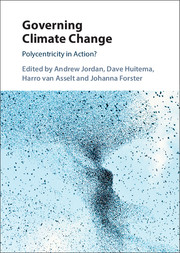
Linkages: understanding their role in polycentric governance
Philipp Pattberg / Sander Chan / Lisa Sanderink / Oscar WiderbergExterne Publikationen (2018)
in: Andrew Jordan / Dave Huitema / Harro van Asselt / Johanna Forster (eds.), Governing climate change: polycentricity in action?, Cambridge, UK: Cambridge Univ. Pr, 169-187
ISBN: 978-1-10841-812-6
DOI: https://doi.org/10.1017/9781108284646
Volltext/Document
From a research perspective, ‘linkages’ is a broad and diverse concept. Linkages can be material, functional, biophysical or a ‘fact of life’. For instance, climate change has an impact on biodiversity and poverty levels in countries lacking adaptive capacity. We focus, however, on institutional linkages that occur directly or indirectly, intentionally or unintentionally, among climate actions. Cities, for instance, collaborate and compete with other cities for resources; they are also dependent on the actions by the regions and countries in which they are located, the companies and industries driving their economies and their citizens.
From a policy perspective, coordinating and improving linkages between actors and institutions has started to gain traction. The 2015 Paris Agreement under the United Nations Framework Convention on Climate Change (UNFCCC) could be seen as marking a decisive shift towards more polycentric climate governance, increasingly trying to harness the potential benefits of linkages, while at the same time attempting to minimise the risk of conflict and overlap. The system of nationally determined contributions offers opportunities for new collaborations between public and private actors, and for strengthening existing linkages. The outcomes of the Paris climate summit gave unprecedented recognition to non-state actors (or, in UNFCCC jargon, ‘non-party stakeholders’) and cooperative initiatives in delivering climate action.
Against this background, we analyse linkages between state, non-state and subnational climate actions in the context of an emerging polycentric climate governance architecture. We begin by observing that the emerging polycentric climate system constitutes a networked structure, wherein individual actors interact with each other. To better assess the nature, quality and impacts of these interactions, we offer a discussion of previous conceptualisations of institutional linkages showing how climate actions by a myriad of cities, regions, companies and civil society organisations are connected. We then provide several illustrative examples for the main categories of linkages, focusing on interactions between transnational and international organisations. We then discuss the current and prospective approaches to ensure that climate actions interact synergistically with the intergovernmental UNFCCC regime and how synergistic interactions can be improved.
Finally, we reflect on the core propositions of polycentric governance theory to assess its usefulness in analysing the current landscape of climate governance.

